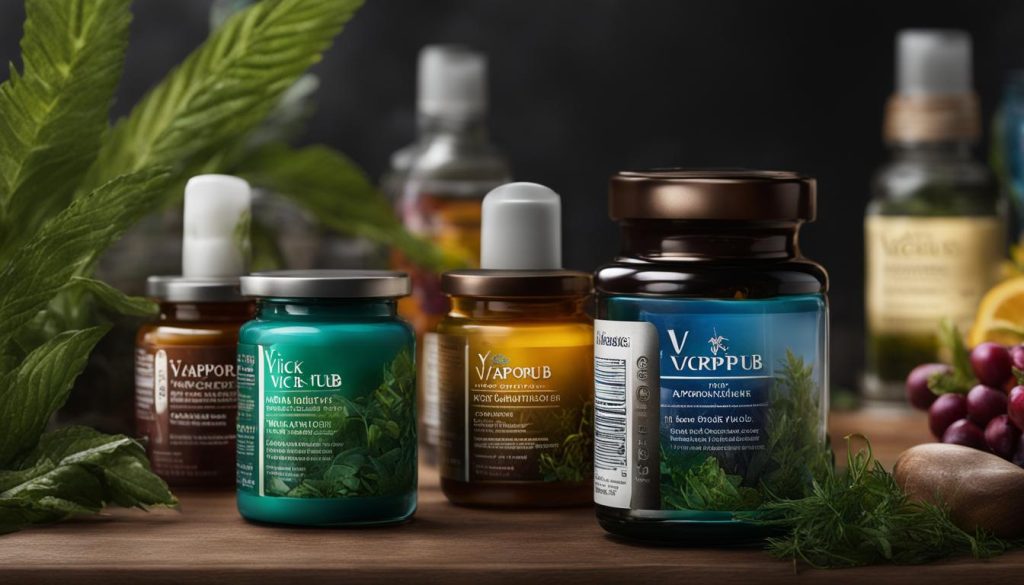In this article, I will dive into the question that many pet owners ask: Is Vicks safe for dogs? Vicks Vapor Rub is a popular product used by humans to relieve colds and congestion, but its potential dangers for our furry friends cannot be ignored.
It is essential to understand the risks associated with using Vicks on dogs. The main ingredient in Vicks, camphor, is toxic to dogs and can lead to various symptoms, including skin irritation, weakness, nausea, vomiting, seizures, and even death in rare cases. Whether it is ingestion or inhalation, exposing dogs to Vicks can be harmful and should be avoided to ensure their safety.
- Using Vicks on dogs can be dangerous due to the toxic effects of camphor.
- Camphor poisoning in dogs can result in severe symptoms and even fatalities.
- Avoid applying or exposing dogs to Vicks to prevent skin irritation, vomiting, seizures, and other health issues.
- Consult with a veterinarian for safe alternatives to address dog cough, congestion, allergies, and other common concerns.
- Ensure the safety of your furry friend by keeping Vicks and similar camphor-based products out of their reach.
What are the main ingredients in Vicks Vaporub?

Vicks Vaporub contains several key ingredients that give it its distinctive scent and properties. These ingredients include:
- Camphor: Camphor is a white, waxy substance that is derived from the wood of the camphor tree. It is known for its strong, aromatic odor and has been used for centuries for its medicinal properties.
- Eucalyptus Oil: Eucalyptus oil is derived from the leaves of the eucalyptus tree. It has a fresh, minty aroma and is commonly used for its soothing effects on the respiratory system.
- Menthol: Menthol is a compound extracted from mint plants. It produces a cooling sensation on the skin and helps to relieve nasal congestion.
- Cedarleaf Oil: Cedarleaf oil is derived from the leaves of cedar trees. It has a woody, balsamic scent and is often used for its calming and antiseptic properties.
- Nutmeg Oil: Nutmeg oil is extracted from the seeds of the nutmeg tree. It has a warm, spicy aroma and is believed to have analgesic and anti-inflammatory effects.
- Petroleum: Petroleum jelly is a semi-solid mixture of hydrocarbons. It is used as a base in many topical ointments and helps to lock in moisture and protect the skin.
- Thymol: Thymol is a natural compound found in thyme and other herbs. It has antimicrobial properties and is commonly used in oral care products.
- Turpentine Oil: Turpentine oil is derived from the resin of certain pine trees. It has a strong, pungent odor and is used for its solvent properties.
These ingredients work together to create the unique formula of Vicks Vaporub and provide its characteristic scent and therapeutic effects. However, it is important to note that while these ingredients may be safe and beneficial for humans, they can be harmful to dogs.
Are the main ingredients in Vicks Vaporub harmful to dogs?
Yes, the main ingredients in Vicks Vaporub, especially camphor, are harmful to dogs. Camphor poisoning can occur if a dog licks or ingests Vicks or similar products. The toxicity level of Vicks for dogs is listed as mild to moderate, but the effects of camphor can be concerning and even fatal. Dogs may experience skin irritation, nausea, vomiting, seizures, and other serious symptoms. It is important to keep Vicks and other camphor-based products away from dogs to prevent any potential harm.
To better understand the dangers of Vicks for dogs, let’s take a closer look at the main ingredients:
| Ingredient | Potential Harm to Dogs |
|---|---|
| Camphor | Can cause skin irritation, nausea, vomiting, seizures, and even death in rare cases. |
| Eucalyptus Oil | May cause gastrointestinal upset and skin irritation in dogs. |
| Menthol | Can lead to gastrointestinal upset and difficulty breathing if inhaled in high concentrations. |
| Cedarleaf Oil | May cause skin irritation and gastrointestinal upset. |
| Nutmeg Oil | Can be toxic to dogs if ingested in large amounts and may cause neurological symptoms. |
| Petroleum | Can cause gastrointestinal upset if ingested and skin irritation if applied topically. |
| Thymol | May cause gastrointestinal upset and skin irritation in dogs. |
| Turpentine Oil | Can be toxic to dogs if ingested and may cause gastrointestinal upset and respiratory issues. |
Given these potential risks, it is best to avoid using Vicks and similar products on dogs. There are safer alternatives for addressing common health issues in dogs, such as consulting with a veterinarian for appropriate medications or treatments. Protecting our furry friends from potential harm should always be a top priority.
Is Vicks Bad for Dogs to Inhale?

Inhalation of Vicks can be harmful to dogs, posing risks to their respiratory health. While dogs may find the smell of Vicks obnoxious and repellent, inhaling the fumes can affect their respiratory system. Dogs with sensitive dry eyes may experience a burning sensation when exposed to Vicks fumes. Therefore, it is best to avoid having dogs inhale Vicks to ensure their overall well-being.
Exposure to Vicks fumes can cause irritation and discomfort for dogs. The menthol and other ingredients in Vicks can irritate their nasal passages and airways, leading to coughing, sneezing, and potentially exacerbating any respiratory conditions they may have. Additionally, dogs may be at risk of accidentally ingesting or licking Vicks, further compounding the potential harm. To prioritize the respiratory health of our furry friends, it is crucial to avoid using Vicks in a manner that allows them to inhale the fumes.
“Inhalation of Vicks fumes can have harmful effects on dogs, especially those with sensitive respiratory systems. It is important to prioritize their well-being and avoid exposing them to these potentially irritating substances.”
Instead of using Vicks or similar products, there are safer alternatives available for addressing common respiratory issues in dogs. Consulting with a veterinarian can help identify appropriate treatments and remedies specifically designed for our canine companions, ensuring their comfort and well-being without the risks associated with inhaling Vicks fumes.
Can I use Vicks on my dogs for fleas?

Vicks Vaporub is not recommended for use on dogs as a flea control method. While Vicks contains eucalyptus oil, which is sometimes used for natural flea control, the high camphor content in Vicks can be toxic to dogs. Applying Vicks to dogs can cause skin irritation, vomiting, and even seizures. It is important to prioritize the safety and well-being of our furry friends by using safer alternatives for dog flea control.
Instead of using Vicks, there are other options available that are specifically formulated for dogs and are effective in controlling fleas. These alternatives include using essential oils like eucalyptus oil (without camphor), tea tree oil, lavender oil, or rose geranium oil, which have flea repellent properties. Additionally, there are various flea control products such as spot-on treatments, oral medications, and flea collars that are designed for safe use on dogs.
Consulting with a veterinarian is highly recommended for the best flea control solution for your dog. They can provide valuable guidance on safe and effective methods, products, and dosages to ensure the health and comfort of your furry companion.
| Vicks for Dog Fleas | Dangers of Using Vicks for Flea Control in Dogs | Safe Alternatives for Dog Flea Control |
|---|---|---|
|
|
|
Using Vicks on dogs for flea control is not recommended. The high camphor content in Vicks can be toxic to dogs and cause adverse reactions such as skin irritation, vomiting, and seizures. It is essential to prioritize the safety and well-being of our furry companions by using safe alternatives that are specifically formulated for dog flea control. Consulting with a veterinarian is advised for the best flea control solution tailored to your dog’s needs.
Can I use Vicks to stop my dog from chewing?

Using Vicks to deter a dog from chewing is a controversial practice within the dog community. While Vicks has a strong smell that can be repulsive to dogs, it is important to consider the potential dangers and side effects of using Vicks for this purpose. Accidental ingestion or inhalation of Vicks can lead to poisoning symptoms in dogs, including skin irritation, nausea, vomiting, and even seizures. Therefore, it is advisable to explore safe alternatives to discourage dog chewing.
One effective approach is to provide appropriate chew toys for your dog. By offering a variety of chew toys made from safe materials, you can redirect your dog’s chewing behavior onto these toys instead of household items. It is important to choose toys that are suitable for your dog’s size, breed, and chewing strength to prevent any potential choking hazards.
Additionally, seeking guidance from a veterinarian or professional dog trainer can be beneficial in addressing chewing issues. They can help identify the underlying reasons behind your dog’s chewing behavior and provide valuable advice on training techniques and behavioral modifications. Remember, understanding the root cause of the chewing behavior is crucial in finding the right solution.
| Safe Alternatives for Dog Chewing Prevention |
|---|
| Provide appropriate chew toys |
| Choose toys suitable for your dog’s size and breed |
| Seek guidance from a veterinarian or professional dog trainer |
To summarize, while Vicks may have a strong odor that may deter dogs from chewing, its potential risks and side effects outweigh its benefits. It is best to avoid using Vicks or similar products as a method to stop your dog from chewing. Instead, focus on providing safe alternatives such as chew toys and seeking professional guidance to address the underlying causes of the chewing behavior.
“Using Vicks to deter a dog from chewing is a controversial practice within the dog community.”
Can I use Vicks in my humidifier for my dog?
Using Vicks in a humidifier for dogs is a topic that sparks curiosity among pet owners. However, it is important to understand the risks associated with this practice. The menthol and camphor present in Vicks can be irritating to dogs, especially those with sensitive eyes or respiratory issues. The inhalation of Vicks through a humidifier can potentially harm your furry friend, leading to discomfort and respiratory distress. To ensure the well-being of your dog, it is best to avoid using Vicks or similar products in humidifiers intended for dogs.
| Risks of using Vicks in a humidifier for dogs | Safe alternatives for dog humidification |
|---|---|
| Inhalation of Vicks may cause respiratory irritation and discomfort to dogs, particularly those with sensitive eyes or respiratory issues. | Use plain water in the humidifier, ensuring a comfortable and safe environment for your dog’s respiratory health. |
| Menthol and camphor in Vicks can potentially worsen existing respiratory conditions in dogs, leading to further complications. | Consider investing in pet-specific humidifiers that are designed to meet the respiratory needs of dogs without the use of potentially harmful substances. |
| Exposure to Vicks fumes may cause discomfort for dogs and can interfere with their overall well-being. | Consult with your veterinarian for safe and effective alternatives for dog humidification, tailored to your pet’s specific needs. |
Ensuring a safe environment for your dog is paramount, and avoiding the use of Vicks in humidifiers is a simple yet important step towards their well-being. By exploring alternative methods of dog humidification and consulting with your veterinarian, you can provide a comfortable and healthy living space for your furry companion.
Can I put Vicks on my male dog’s nose to stop him from smelling females in heat?

Using Vicks or any other camphor-based product on a male dog’s nose to deter him from smelling females in heat is not recommended. While some breeders may suggest this method, it can pose serious dangers to the health and well-being of the male dog.
The main ingredient in Vicks, camphor, is toxic to dogs and can cause various adverse effects when ingested or applied topically. When a male dog is in close proximity to a female dog in heat, his natural instinct is to detect her pheromones. This behavior plays an important role in canine reproduction, and interfering with it using Vicks can disrupt the natural breeding process.
Instead of using Vicks, there are safer alternatives for managing male dogs during the breeding season. Consulting with a veterinarian is highly recommended to explore effective and humane methods of handling male dogs’ natural behaviors. A veterinarian can provide guidance on behavioral training, distraction techniques, or even considering neutering as a long-term solution.
What should I do if my dog eats Vicks?

If your dog ingests Vicks, it is crucial to take immediate action to ensure their safety. Here are the steps you should take:
- Stay calm: It is understandable to feel worried, but it’s important to remain calm and focused on helping your dog.
- Contact your veterinarian: Reach out to your veterinarian or the nearest veterinary clinic and inform them about the situation. Provide details about the ingestion, including the quantity and any symptoms your dog may be experiencing.
- Gather information: If possible, have the Vicks bottle nearby to provide important information to the veterinarian. They may need to know the exact ingredients and concentration to determine the best course of action.
- Follow professional advice: Your veterinarian will provide guidance based on the specific circumstances. They may instruct you to induce vomiting, depending on the time elapsed since ingestion and the amount consumed. It is crucial to follow their instructions carefully.
- Seek emergency care if necessary: In some cases, immediate medical intervention may be required. If your veterinarian advises you to seek emergency care, do not hesitate to do so.
Remember, time is of the essence when dealing with potential poisoning. Acting quickly and seeking professional help is the best way to ensure your dog’s well-being.
Table: Signs of Vicks ingestion in dogs
| Signs of Vicks ingestion in dogs | Severity |
|---|---|
| Vomiting | Mild to Moderate |
| Diarrhea | Mild to Moderate |
| Salivation | Mild to Moderate |
| Weakness | Moderate |
| Seizures | Severe |
| Coma | Severe |
“Acting quickly and seeking professional help is the best way to ensure your dog’s well-being.”
It is important to note that the severity of symptoms can vary depending on factors such as the size and health of the dog and the amount of Vicks ingested. While mild cases may cause only temporary discomfort, larger doses or sensitive individuals may experience more severe reactions.
By taking swift action and following the guidance of a veterinarian, you can help minimize the potential harm caused by Vicks ingestion and safeguard your dog’s health.
Wrapping Up
To summarize, it is crucial to understand that Vicks Vaporub is not safe for dogs. The main ingredient, camphor, is toxic to dogs and can lead to severe health issues. Symptoms such as skin irritation, weakness, nausea, vomiting, seizures, and even death can occur if dogs ingest or come into contact with Vicks. Therefore, it is essential to keep Vicks and other camphor-based products out of reach to ensure the safety of our beloved furry friends.
Instead of using Vicks, there are alternative methods and products available for addressing common dog issues. Consulting with a veterinarian is the best course of action to find safe and effective solutions specifically designed for dogs. They can recommend appropriate treatments for cough, congestion, flea control, and other concerns without putting your dog’s health at risk.
Remember, when it comes to your dog’s well-being, it is crucial to prioritize their safety above all else. By avoiding the use of Vicks and opting for safer alternatives, you can ensure that your dog remains happy and healthy.
FAQ
Is Vicks Vaporub safe for dogs?
No, Vicks Vaporub is not safe for dogs. It contains camphor, which is toxic to dogs and can cause various symptoms and even death in rare cases.
What are the main ingredients in Vicks Vaporub?
The main ingredients in Vicks Vaporub are camphor, eucalyptus oil, and menthol. Other minor ingredients include cedarleaf oil, nutmeg oil, petroleum, thymol, and turpentine oil.
Are the main ingredients in Vicks Vaporub harmful to dogs?
Yes, the main ingredients in Vicks Vaporub, especially camphor, are toxic to dogs. Ingestion or application of Vicks can cause various health issues in dogs.
Is Vicks bad for dogs to inhale?
Yes, inhaling Vicks can be harmful to dogs. The fumes can affect their respiratory system and cause discomfort, especially for dogs with sensitive dry eyes.
Can I use Vicks on my dogs for fleas?
No, using Vicks for flea control in dogs is not recommended. Camphor in Vicks can cause skin irritation and other health issues in dogs.
Can I use Vicks to stop my dog from chewing?
Using Vicks to deter dog chewing is controversial and not recommended. Accidental ingestion or inhalation of Vicks can lead to poisoning symptoms in dogs.
Can I use Vicks in my humidifier for my dog?
No, using Vicks in a humidifier for dogs is not recommended. The menthol and camphor in Vicks can be irritating to dogs, especially those with sensitive eyes.
Can I put Vicks on my male dog’s nose to stop him from smelling females in heat?
No, using Vicks on a male dog’s nose is not recommended. It can be harmful to dogs, and there are safer methods for managing male dogs during the breeding season.
What should I do if my dog eats Vicks?
If your dog ingests Vicks, it is important to seek immediate veterinary care. Camphor ingestion can be toxic and potentially life-threatening for dogs.






